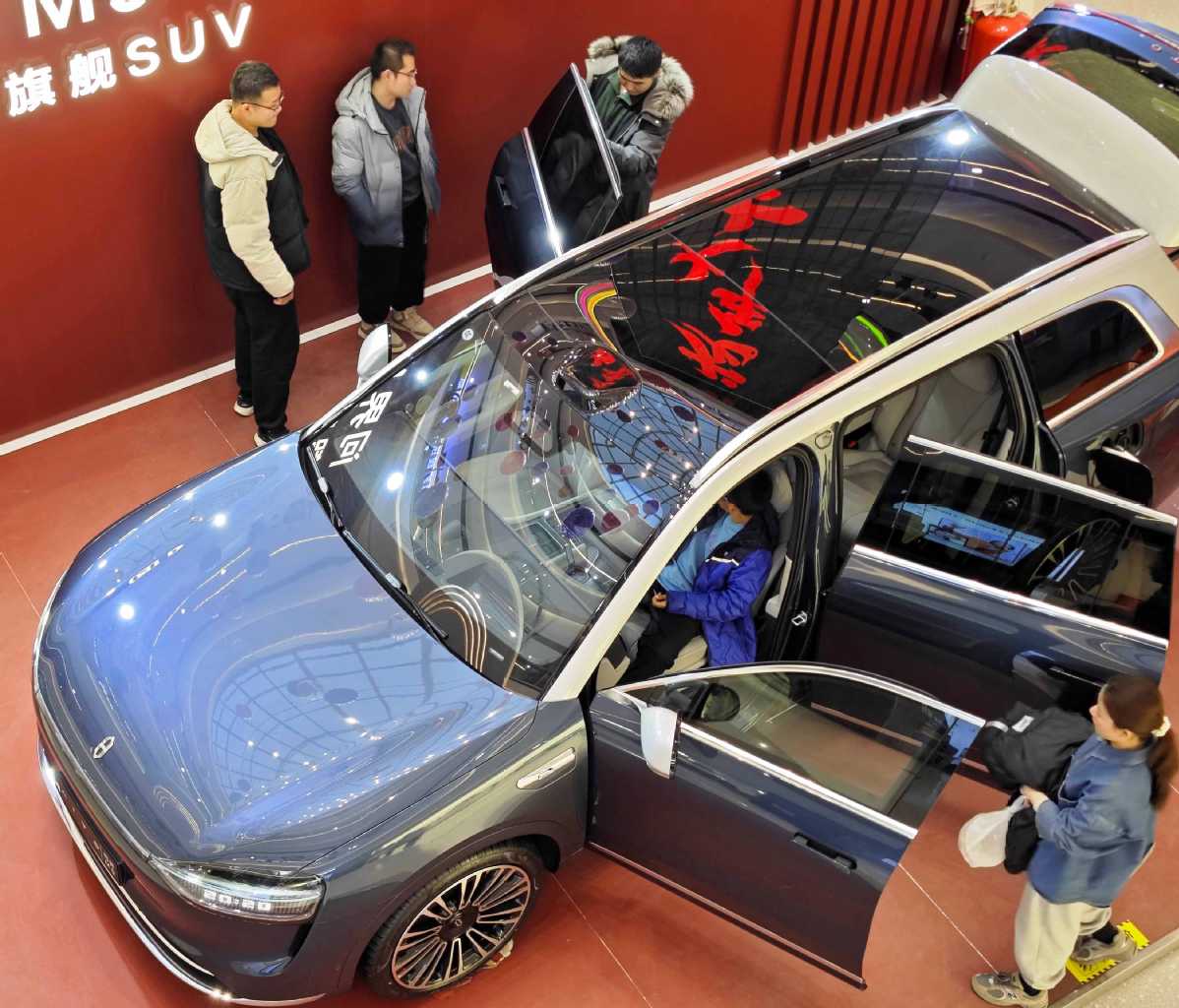Strong start to year as car sales boom in China
Domestic marques rank first in terms of growth, selling 1.12 million vehicles


Retail sales of passenger vehicles soared in China in January, of which those from Chinese brands saw the highest growth, according to the China Passenger Car Association.
Over 2.03 million sedans, SUVs and MPVs were sold in the month, up 57.4 percent year-on-year, said the CPCA.
It added that the growth could have been higher but some customers had been lured to place orders in December as carmakers offered coupons in an effort to boost their whole-year sales figures.
Chinese marques ranked first in terms of growth in January. Combined, they sold 1.12 million vehicles in January, up 77 percent from the same month of 2023.
In comparison, mainstream international volume brands in the country, such as Volkswagen and Toyota, saw their combined deliveries stand at 670,000 units, up 43 percent year-on-year.
The CPCA said the discrepancy in the growth rate was because international brands were primarily those who offered discounts to attract gasoline car buyers to place orders in late 2023. Also, Chinese brands have gained the upper hand in the new energy vehicle sector.
The popularity of Chinese brands propelled them to seize a combined 55.1 percent of the passenger car market share in January, up 5.9 percentage points from the same month of 2023.
A closer study of the charts in the month shows that the gains were primarily from Volkswagen, whose market share fell by 3.8 percentage points to 19.2 percent.
It was followed by two major carmakers from the United States, Ford and General Motors, which saw their combined share slip 1.3 percentage points to 6.5 percent in January.
But that does not mean all Chinese marques had equally excellent performances in that month, said the CPCA.
Its statistics show that there were 33 Chinese carmakers that sold more than 10,000 vehicles in January.
Of them, eight saw their sales more than double in the month; 23 saw their sales grow more than 10 percent and seven saw their sales fall compared with the same month of 2023.
The CPCA said FAW, Dongfeng and Changan did better than average in January.
Also, Chinese brands outperformed their overseas rivals in terms of NEV sales, which are growing faster than gasoline vehicles.
Statistics from the CPCA show that 51.8 percent of new car sales from Chinese brands were NEVs, but the average figure for international volume brands in China was merely 5.1 percent.
There were 18 carmakers who sold more than 10,000 NEVs in January, but only three were international brands: Tesla, GM and Volkswagen.
Volkswagen's two Chinese joint ventures sold a combined 19,000 NEVs in the month, accounting for 47.8 percent of total NEV sales from global volume brands' joint ventures in the country.
January saw good vehicle exports from China as well. More than 355,000 vehicles, of which 296,000 units were from Chinese brands, were shipped overseas in the month, up 51 percent year-on-year.
NEVs were yet to emerge as the lion's share of vehicle exports. They accounted for just 26.8 percent of total vehicle exports in January. Around one-third of the NEV exports, which stood at 95,000 units, were Tesla vehicles made at its Shanghai plant.
Of those from Chinese brands, small-sized electric vehicles accounted for roughly 60 percent, especially in Southeast Asian countries including Thailand and some parts of Europe.
The growing number of China-made EVs on overseas streets is seen as the harbinger of their prospective dominance and have gotten on the nerves of some politicians who clamor to protect their domestic automotive industry.
Reuters reported that European Commission investigators arrived in China in January to inspect Chinese automakers as part of a probe into whether to impose punitive tariffs to protect European EV makers.
The probe, launched in October and scheduled to last 13 months, seeks to determine whether Chinese-made EVs benefit unfairly from subsidies from the Chinese government.
Analysts said the move is ironic as European countries, including France, are handing out subsidies after China stopped the financial stimuli to EV buyers in 2022, one year earlier than Germany.
It is the mass adoption of EVs in China as a result of its early-mover advantage and the country's sound industrial chain, ranging from batteries to in-cabin displays, that have slashed China-made EVs' costs and sharpened their competitive edge, said analysts.
The arrival of Chinese EVs has added impetus to European automakers' efforts to develop more affordable models, reported Reuters.
"Of course, everybody is trying to reduce the cost of EVs," to reach price parity with combustion engine models, said Renault CEO Luca de Meo.
Meanwhile, Ford CEO Jim Farley said: "If you cannot compete fair and square with the Chinese around the world then 20 percent to 30 percent of your revenue is at risk."
Ford has projected it will lose $5-5.5 billion on its EVs this year. The company has launched a dedicated team to design a small, low-cost EV that could compete with BYD's Seagull model, Farley said.




































